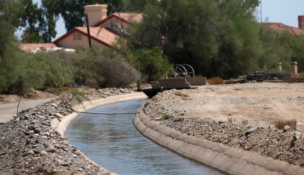The first 100 days
Arizona Capitol Reports Staff//April 18, 2008//[read_meter]
The Arizona Constitution states that the annual legislative session is to be completed in less than 100 days, but that’s only happened once in the last decade.
The second regular session of the 48th Legislature certainly won’t meet that deadline — April 22 this year — even though regular committee work has stopped and lawmakers are generally in a holding pattern, waiting to vote on bills still in the pipeline.
The session has been dominated by budget negotiations, as lawmakers must find a way to claw the state out of a $1.2 billion deficit in the current fiscal year and address an estimated $1.7 billion shortfall in the upcoming year, all while meeting the constitutional mandate of having a balanced budget.
Though the Legislature hasn’t met the 100-day sine die requirement since 2000, the date does provide an opportunity to gauge the progress of the session. Based on the number of bills that have been approved so far and those that are still advancing through the House and Senate, the workload for lawmakers this year has been considerably less than in recent years.
Last year, the Legislature passed 318 bills, of which 296 were signed by Gov. Janet Napolitano. This year, however, through 96 days — lawmakers were not scheduled to meet again until the 100th day — legislators were on pace to pass the fewest number of bills since 1993, when the Legislature gave approval to 261 bills.
Currently, 80 bills have been approved by the House and Senate and only 200 or so measures are likely to continue advancing.
“The pace has been despacisisimo,” said House Minority Leader Phil Lopes, using a Spanish word for “very, very slowly.”
Sen. Jack Harper said one of the reasons fewer bills are moving through the process is because the House of Representatives cancelled committee hearings for a week at the beginning of the session to focus on addressing the budget shortfall.
“That caused the majority of members' bills to fail to get a hearing,” he said.
Despite the fewer number of measures moving through the pipeline, some lawmakers say the pace has actually been faster this year than last, when the Legislature took 164 days to finish its work, adjourning for the year June 20.
A lengthy session last year was expected from the outset, though, and Republican leaders spread much of the workload out over the final six weeks, accordingly.
“It seems like things are moving much faster (this year). There is less extending of deadlines and much less sitting around doing nothing,” said Rep. David Schapira, a Tempe Democrat.
And while the amount of work completed so far is down, legislators said the work completed so far, while perhaps less than normal, is extremely important. Lawmakers have voted on bills to provide insurance coverage to autistic children, to stop investing in the troubled African nation of Sudan, to prevent illegal immigrants from possessing guns and to protect consumers from identify theft.
Lopes said the most significant accomplishment has been the ability of House Democrats to unite “to protect Arizona’s crucial investments in education and health care.”
Democrat Rep. Pete Rios and Republican Rep. Nancy McLain both pointed to another significant milestone: a $40 million appropriation to pay for English-acquisition programs for Arizona students who speak a different primary language.
Senate Assistant Minority Leader Jorge Luis Garcia said he is particularly proud of “getting my Republican colleagues to accept the fact of bonding for school construction” as a budget component.
But Snowflake Republican Sen. Jake Flake was unimpressed by the actions of lawmakers this year. He said the Legislature has yet to accomplish anything significant.
Some legislators were upset about the amount of time it has taken to work out a budget plan. Almost unanimously, those responding to an e-mail survey about legislative work this year cited the budget as the most important action for lawmakers.
McLain said the issue should have taken precedence over all other work.
“I’m one of those we believe we shouldn’t have done anything this year until we took care of (the budget),” she said.
Rep. Mark Anderson, a Mesa Republican, placed the blame for the inaction on the budget squarely at the feet of Napolitano.
“For some reason, the governor doesn’t seem to feel the urgency and refuses to face reality,” he said. “Other states are cutting their budgets, cities and counties are cutting their budgets, companies in the private sector are cutting expenses. It is time we do the same.”
But Napolitano said Republican leaders have dragged their feet on a budget deal.
“I cleared my calendar for the past four weeks to try to get a budget negotiated and I have not sensed the sort of urgency necessary to really get to the table and reach an agreement,” she said. “This should be the Legislature’s only and top priority this year.
“Their language aside, their rhetoric aside, they’re not ready yet and I urge them to get back to the table, get back within their caucuses and get me a budget that I can sign.”
On April 17, it appeared as though lawmakers were close to passing a budget bill. As of press time, a vote had yet to take place.
Some hope the work, beyond the budget, is not yet done.
Rep. David Schapira said lawmakers need to approve a measure that would allow high school seniors to apply some of their coursework to their AIMS scores in order to graduate
Yuma Democrat Theresa Ulmer pined for the Legislature to agree on how to reform the state’s trust-land laws.

















